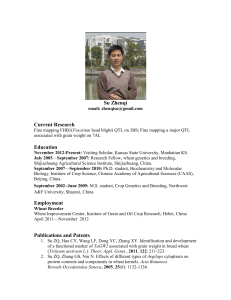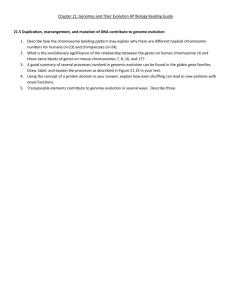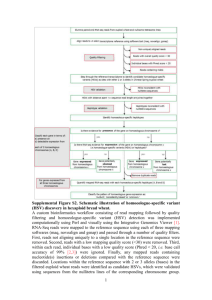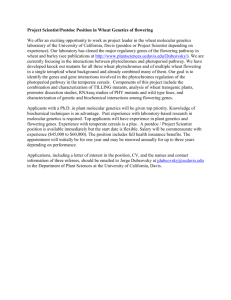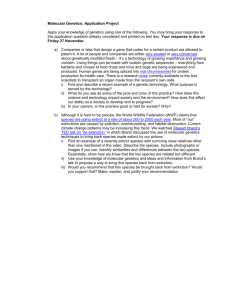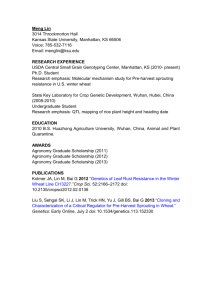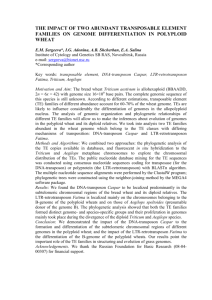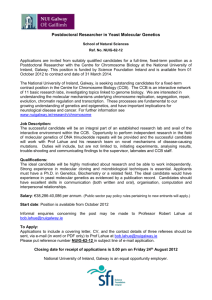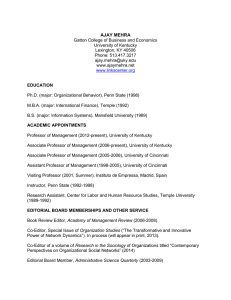recruitment role profile form - Jobs
advertisement
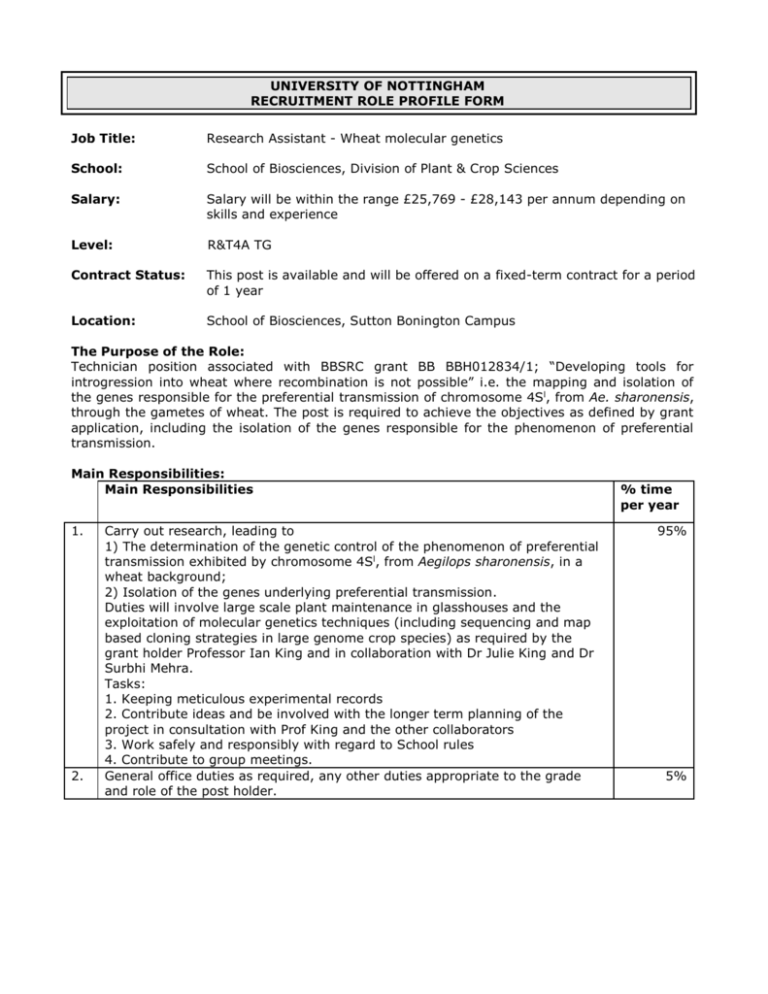
UNIVERSITY OF NOTTINGHAM RECRUITMENT ROLE PROFILE FORM Job Title: Research Assistant - Wheat molecular genetics School: School of Biosciences, Division of Plant & Crop Sciences Salary: Salary will be within the range £25,769 - £28,143 per annum depending on skills and experience Level: R&T4A TG Contract Status: This post is available and will be offered on a fixed-term contract for a period of 1 year Location: School of Biosciences, Sutton Bonington Campus The Purpose of the Role: Technician position associated with BBSRC grant BB BBH012834/1; “Developing tools for introgression into wheat where recombination is not possible” i.e. the mapping and isolation of the genes responsible for the preferential transmission of chromosome 4Sl, from Ae. sharonensis, through the gametes of wheat. The post is required to achieve the objectives as defined by grant application, including the isolation of the genes responsible for the phenomenon of preferential transmission. Main Responsibilities: Main Responsibilities 1. 2. Carry out research, leading to 1) The determination of the genetic control of the phenomenon of preferential transmission exhibited by chromosome 4Sl, from Aegilops sharonensis, in a wheat background; 2) Isolation of the genes underlying preferential transmission. Duties will involve large scale plant maintenance in glasshouses and the exploitation of molecular genetics techniques (including sequencing and map based cloning strategies in large genome crop species) as required by the grant holder Professor Ian King and in collaboration with Dr Julie King and Dr Surbhi Mehra. Tasks: 1. Keeping meticulous experimental records 2. Contribute ideas and be involved with the longer term planning of the project in consultation with Prof King and the other collaborators 3. Work safely and responsibly with regard to School rules 4. Contribute to group meetings. General office duties as required, any other duties appropriate to the grade and role of the post holder. % time per year 95% 5% Knowledge, Skills, Qualifications & Experience Essential Qualifications/ HNC or BSc, in plant or crop science, Education including molecular biology. Skills/Training Molecular genetics, plant molecular biology (DNA extraction and PCR), basic bioinformatics (primer design and BLAST) Experience 1. Previous experience of large scale plant maintenance, husbandry, vernalisation. 2. Molecular biology laboratory experience. Proven ability to problem solve and to provide innovative solutions. 3. Ability to work effectively as part of a team or independently as required 4. Willingness to learn new experimental/intellectual techniques 5. Motivation and commitment 6. Good time management skills, ability to prioritise and meet deadlines 7. Able to communicate effectively with supervisors and collaborators Desirable Degree subject matter associated with genetics, molecular biology, plant cytogenetics Advanced understanding and direct experimental experience of plant molecular genetics, plant cytogenetics, advanced bioinformatics (sequence alignments) 1. Experience of working in the area of plant classical/molecular genetics 2. Computer skills, including manipulation of DNA sequence information, biology-database searching, etc. Decision Making i) taken independently by the role holder; 1. Have day to day responsibility for the conduct and satisfactory progress of the research 2. Keep meticulous experimental records 3. Work safely and responsibly with regard to School rules ii) taken in collaboration with others; 1. Communicate with the other collaborators and attend meetings with them as required 2. Contribute ideas and be involved with the longer term planning of the project in consultation with Prof King, Dr Julie King and Dr Surbhi Mehra. 3. Contribute to group meetings. iii) referred to the appropriate line manager (Surbhi Mehra) by the role holder. 1. Overall management and direction of research funded by the grant 2. Overall management of research direction of associated technical staff Scope of the Role Research environment: This post is funded as part of BBSRC grant BB BBH012834/1; “Developing tools for introgression into wheat where recombination is not possible” i.e. the mapping and isolation of the genes responsible for the preferential transmission of chromosome 4Sl, from Ae. sharonensis, through the gametes of wheat. This grant, which was awarded to Professor Ian King, and in collaboration with Dr Julie King both in the Division of Plant and Crop Sciences at the University of Nottingham, is for five years. Over the first 3.5 years of the grant, significant research has been carried out by Dr Surbhi Mehra, who has now moved to the wheat/alien introgression programme. The roleholder will continue any analysis pending from Dr Mehra’s research as well as carry out new experiments under her supervision along-with Prof. Ian king and Dr. Julie King until the completion of the grant. The person appointed will join an expanding research group led by Professor Ian King and Dr Julie King focussed on the introduction of genetic variation into wheat and grass from their distant relatives. They will work in the state-of-the-art Plant Sciences Laboratory at the University of Nottingham’s Sutton Bonington Campus and make use of the Universities extensive glasshouse facilities. Informal enquiries may be addressed to Dr Surbhi Mehra, Email: surbhi.mehra@nottingham.ac.uk. Please note that applications sent directly to this Email address will not be accepted. Some relevant research carried out in the host lab related to this post: 1) King. J., Armstead, I.P., Donnison, S.I., Roberts, L.A., Harper, J.A., Skøt, K., Elborough, K., King, I.P. (2007). Comparative analyses between Lolium/Festuca introgression lines and rice reveal the major fraction of functional annotated gene models are located in recombination poor/very poor regions of the genome. Genetics 177: 597-606 2) King, I.P. and Laurie, D.A. (1993). Chromosome damage in early embryo and endosperm development in crosses involving the preferentially transmitted 4S1 chromosome of Aegilops sharonensis. Heredity 70: 52-59. 3) King, I.P., Purdie, K.A., Miller, T.E., Law, C.N. and Rogers, W.J. (1992). Exploitation of chromosome 4Sl from Aegilops sharonensis for the production of stable 44 chromosome wheat. Heredity 69: 160-165. 4) King, I.P., Koebner, R.M.D., Reader, S.M. and Miller, T.E. (1991). Induction of a mutation in the male fertility gene of the preferentially transmitted Aegilops sharonensis chromosome and its application for hybrid wheat production. Euphytica 54: 33-39. 5) King, I.P., Miller, T.E. and Koebner, R.M.D. (1991). Determination of the transmission frequency of chromosome 4Sl of Aegilops sharonensis in a range of wheat genetic backgrounds. Theor. Appl. Genet. 81: 519-523. 6) King, I.P., Koebner, R.M.D., Schlegel, R., Reader, S.M., Miller, T.E. and Law, C.N. (1991). Exploitation of a preferentially transmitted chromosome from Aegilops sharonensis for the elimination of segregation for height in semi-dwarf bread wheat varieties. Genome 34: 944949.
